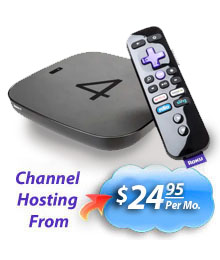Roku Versus Android TV: Choosing the Right Streaming Platform
In the ever-evolving landscape of home entertainment, streaming has become the dominant force. With a multitude of streaming services offering a vast array of channels, the choice of streaming platform is crucial. Two prominent contenders in this space are Roku and Android TV, each with its own unique features and benefits. In this article, we will compare Roku and Android TV to help you decide which one is the right fit for your streaming needs.
Content Selection: Roku vs. Non-Google Android TV
When it comes to content selection, Roku and non-Google Android TV, such as Android TV boxes or TVs not directly tied to Google, offer distinct experiences that cater to a variety of streaming preferences.
Roku's Advantages:
Roku is renowned for its vast and diverse content library. With its user-friendly interface, it provides access to an impressive array of streaming services. The Roku Channel Store boasts thousands of apps, ranging from the most popular ones like Netflix, Hulu, Amazon Prime Video, and Disney+ to more niche and specialized channels. Roku prides itself on being a platform that supports virtually all major streaming services, ensuring that users can access their favorite content. This extensive selection is a compelling feature for those who value variety and options in their streaming experience.
Additionally, Roku offers a universal search feature that allows you to find content across multiple streaming services, making it convenient to locate movies and TV shows without the need to navigate through each app individually. This feature enhances the content discovery process and simplifies the streaming experience.
Non-Google Android TV's Advantages:
Non-Google Android TV platforms, on the other hand, also provide access to a broad spectrum of streaming services. Like Roku, they offer popular apps like Netflix, Amazon Prime Video, and Hulu, making sure that users can enjoy mainstream content. However, the content selection on non-Google Android TV may vary depending on the device and manufacturer. While it doesn't have the same curated and centralized app store as Roku, it still manages to cover a wide range of streaming needs.
Furthermore, non-Google Android TV devices often grant users the freedom to sideload apps, giving them the potential to explore a broader selection of apps and services beyond what's available on official app stores. This flexibility can be attractive to users who want to experiment with less conventional streaming options.
Hardware Comparison
In the realm of hardware and streaming quality, both Roku and non-Google Android TV platforms offer a variety of devices with different capabilities. Roku devices are renowned for their reliability, user-friendliness, and support for 4K Ultra HD and HDR, making them a great choice for those seeking ultra high-end performance. Non-Google Android TV devices come in various forms, with the potential for high-quality streaming experiences, but the quality can vary depending on the manufacturer and specifications. While Roku offers a straightforward and reliable experience, non-Google Android TV provides more customization and a broader range of options for those who seek specific features or brands. Ultimately, your choice will depend on your hardware design preferences, performance requirements, and the level of customization you desire in your streaming setup.
User Interface and Ease of Use
Roku has long been praised for its user-friendly interface. It is known for its simplicity, making it an excellent choice for those who prefer a straightforward and easy-to-navigate platform. The home screen is organized with rows of apps and channels, making it easy to find and access your favorite content.
Android TV, on the other hand, offers a more versatile experience. Its interface is not as straightforward as Roku's, but it offers a more customizable and feature-rich experience. Android TV's home screen includes recommendations and quick access to content, and it integrates seamlessly with other Android devices.
While Roku excels in simplicity, Android TV provides more versatility and personalization. Your choice here may depend on your comfort level with technology and your desire for a more customized experience.
App Store Issues
One significant difference between Roku and Android TV lies in their approach to app distribution and regulation. Roku employs a closed system with a central app store, known as the "Roku Channel Store." This means that if you're a Roku user, you're primarily limited to accessing apps and channels available through Roku's official store. While this approach offers a level of security and quality control, it can be restrictive for users who want to explore a broader range of applications.
In contrast, Android TV, like the broader Android ecosystem, is more open. It doesn't have a centralized app store like Roku. Instead, Android TV users have the freedom to sideload apps from various sources, giving them the ability to access a wider array of applications, including those that may not meet Google's strict Play Store regulations. This flexibility can be advantageous for tech-savvy users who want to experiment with third-party apps and services.
It's essential to weigh the advantages and disadvantages of these different approaches. If you prefer a controlled and secure environment, Roku's centralized app store is a safer bet. But if you value the freedom to explore a more extensive range of apps and are willing to take on the responsibility of ensuring their safety, Android TV's open approach may be more appealing. The decision will ultimately depend on your comfort level with technology and your specific app needs.
Payment Providers
One of the notable distinctions between non-Google Android TV and Roku lies in the flexibility of payment options. With non-Google Android TV, users have the freedom to choose their preferred payment provider. They can use a variety of payment methods and even select alternative app stores for downloading apps, allowing for a more versatile and tailored experience. This flexibility not only empowers users but also encourages healthy competition and innovation within the ecosystem.
On the other hand, Roku's approach is more rigid when it comes to payments. The platform enforces the use of its own payment system for subscriptions and in-app purchases, which means users are limited to Roku's ecosystem. While this can simplify the payment process, it can also be restrictive for those who prefer to use alternative payment providers or explore different purchasing options. Although Roku does allow authorization codes to be used on a Roku channel, the app cannot directly process payments other than through the Roku official app store.
Updates and Support
Both Roku and Android TV receive regular updates, which can bring new features and security enhancements. However, the frequency and timing of these updates can vary based on the specific device or TV manufacturer. It's important to research the track record of the brand and model you're interested in to ensure you'll receive ongoing support and updates.
Cost and Affordability
Roku's affordability and variety of device options are big selling points. You can find Roku devices that fit nearly any budget, from basic streaming sticks to high-end 4K streaming players. This makes Roku an accessible choice for those looking to add streaming capabilities to their existing TV or upgrade to a more advanced device.
Android TV devices, while available in a range of price points, can sometimes be on the higher end of the spectrum, especially when integrated into premium smart TVs. However, if you already own a TV with Android TV built-in, you won't need to purchase a separate device.
The Final Decision
In conclusion, we have determined that having a Roku app is extremely important due to the fact that Roku has vastly more users than AndroidTV. So where does Android TV fit in? Android TV is a great companion app to a Roku app. Android TV is especially important as it helps you ensure that you have a place to post even if fickle, mainstream device-maker app stores endanger your app ecosphere.
The choice between Roku and Android TV comes down to your individual preferences and needs. In the Roku versus Android TV battle, there's no one-size-fits-all answer. Your choice will ultimately depend on your individual preferences and needs. Both devices offer a quality streaming experience and similar features. Here's a quick summary to help you decide:
- Choose Android TV if you value content freedom, customization and versatility, without a centralized corporation determining what you can and can’t watch on your device.
- Choose Roku if you value simplicity, a wide selection of content, and compatibility with a variety of hardware options.
Both platforms have their strengths, and the right choice for you depends on how you want to experience your home entertainment. So, take your time to evaluate your preferences and existing devices before making a decision. In the end, the goal is to enjoy your favorite content hassle-free, regardless of the platform you choose.
MacMillan Interactive Communications, LLC programs and develops both AndroidTV and Roku channels. In addition, we develop Apple iOS, Android, FireTV, AppleTV and SmartTV apps. Please contact MIC for a consultation on yourdevelopment needs. We are happy to help with your project.






